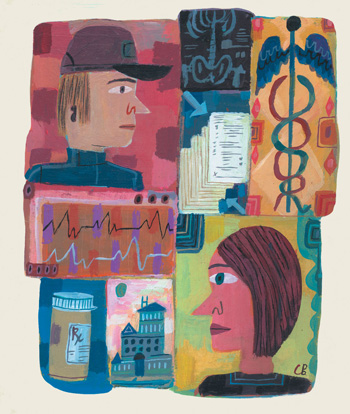Old enough to know?
Calef Brown |
|
 |
|
By DAVID MAGNUS
Question: How old do you have to be to make your own health-care decisions? Can 14- or 15-year-olds make major decisions even if their parents disagree?
Many parents want to shield their sick children from the truth and take on decision-making responsibilities themselves. This is understandable. But most ethicists and the American Academy of Pediatrics argue that teenagers who have the capacity to make informed decisions about their medical care should make them themselves.
One reason is that seriously ill adolescents usually cope better if they can discuss their condition openly and have a say in their treatment. Their parents’ best efforts to protect them from reality can go only so far. Teenagers tend to arrive at the disturbing truth on their own, and secrecy adds to their anxiety. Openness helps parents cope, too, perhaps because they feel less guilt.
It’s helpful to keep in mind that there is no magic line at age 18 that transforms children into autonomous individuals with the ability to make decisions that express their values and preferences. Individuals develop at different rates. In fact, recent psychology research indicates that adolescents are far more capable of making decisions for themselves than had been recognized. By age 14 most young people have the capacity to make informed decisions for themselves. This is especially true of children who have lived with disease.
So the American Academy of Pediatrics and the ethics literature recommend that by age 14 children are entitled to be told about their condition and to make decisions about treatments (including the decision to discontinue treatment). While assessing a child’s capacity must be done on a case-by-case basis, the presumption is that 14 is old enough. Unfortunately, the law typically does not recognize this consensus, making it difficult to convince protective parents to allow the physician to be open with their child.
At the same time, some families expect all decisions to be made by a parent or elder. The family’s cultural background plays a major role here — for example, members of many non-Western communities tend to protect terminally ill patients from full knowledge of their condition. In these cases the physician should respect the preferences of their young patients: Do they want to be informed of their condition? Do they want to be involved in making decisions? Or do they want their parents to decide what’s best?
David Magnus, PhD, directs the Stanford Center for Biomedical Ethics. Send your questions to or Ask the Bioethicist, Stanford Center for Biomedical Ethics, 701 Welch Road, Suite 1105, Palo Alto, CA 94304
Comments? Contact Stanford Medicine at

